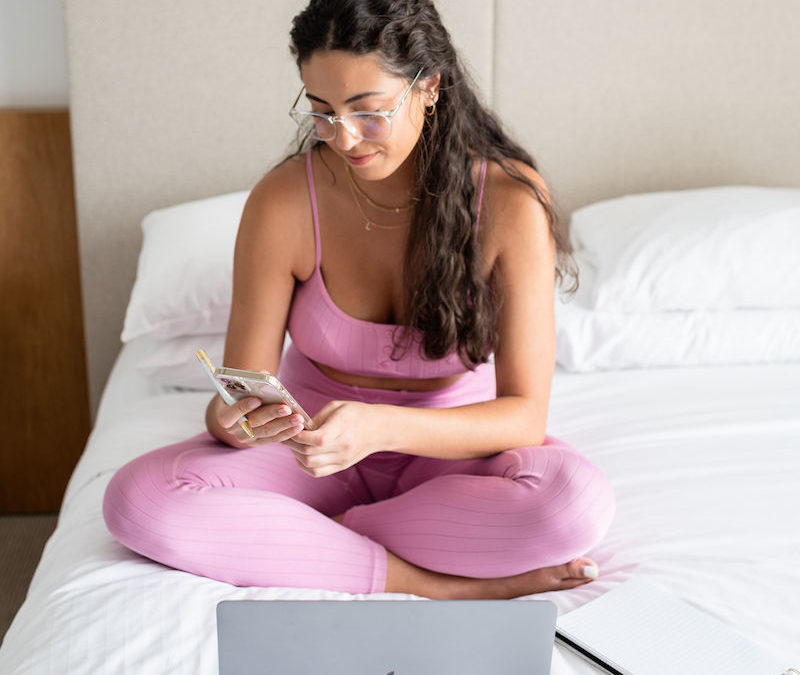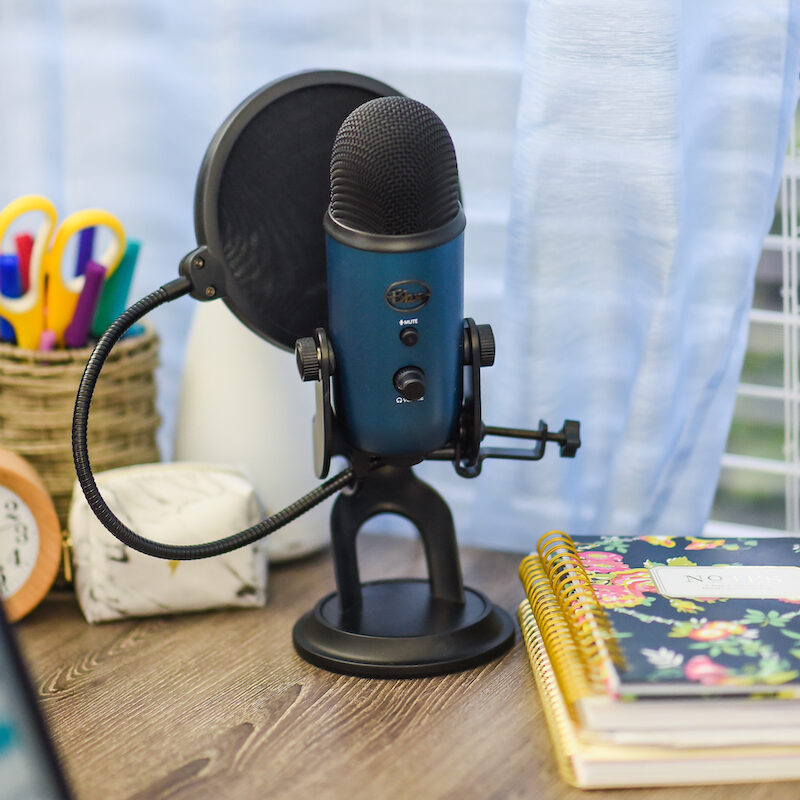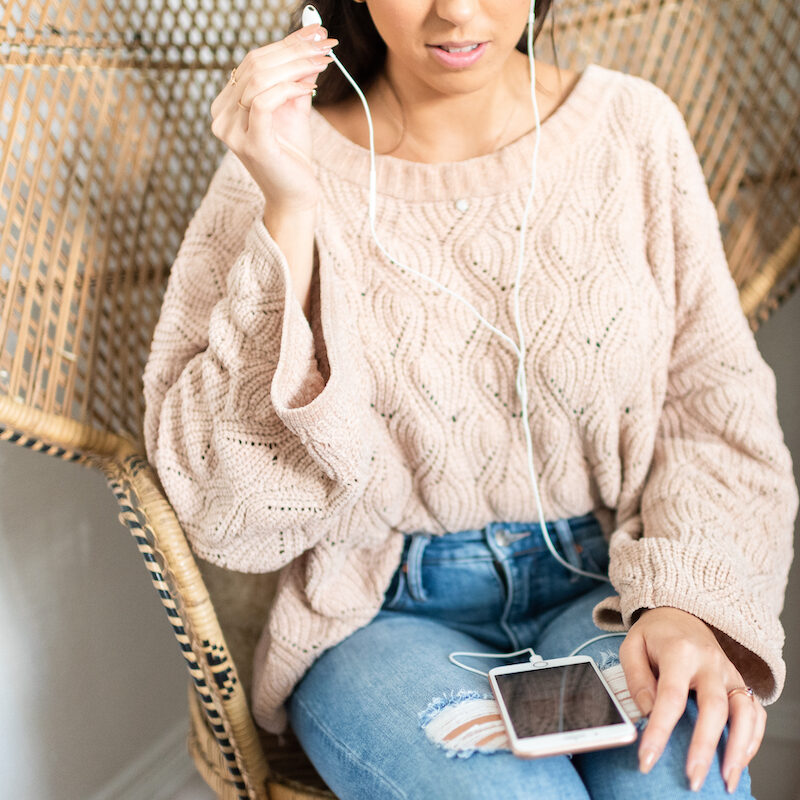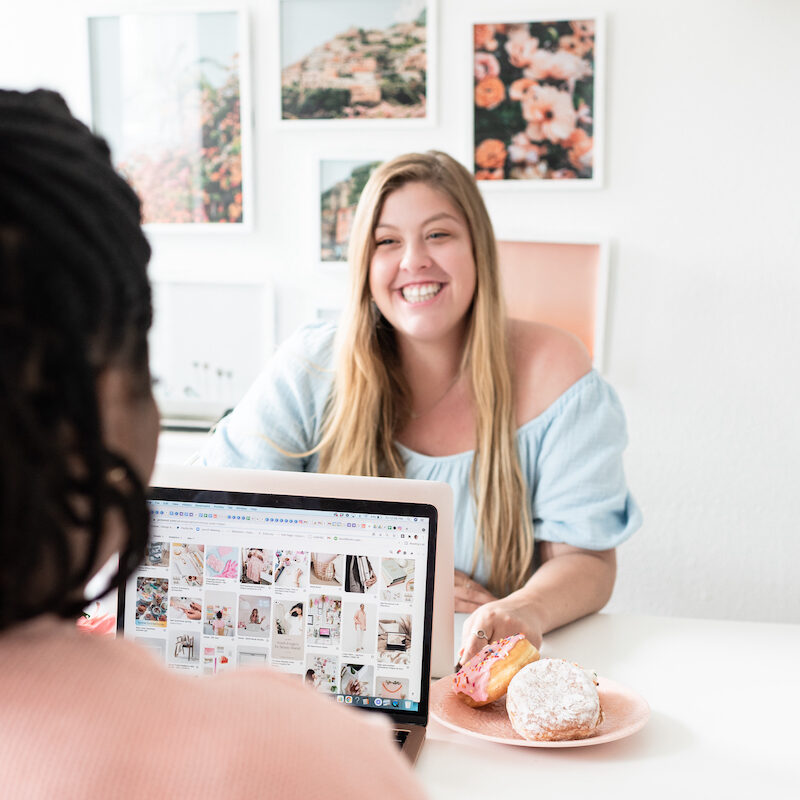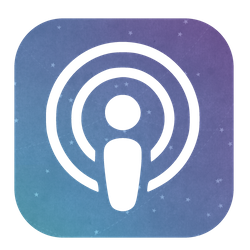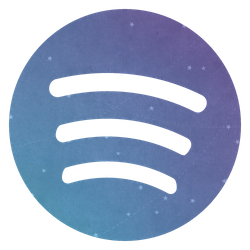episode 21
Self-Care for Web Designers
We believe that your business is meant to fit into your life and not the other way around. We also advocate for having time to live your life outside of the confines of your business.
Today we discuss the value of self-care for web designers and how it can benefit you, your clients and your work.
Episode 21: Self-Care for Web Designers
Show Notes:
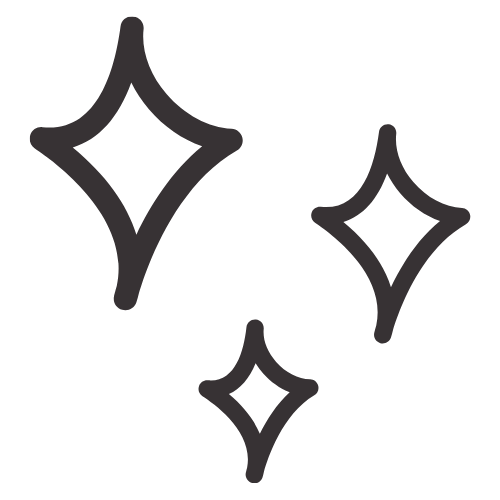




Episode Transcript:
Karyn Paige, Sam Munoz
Karyn Paige 00:00
We’re always talking about this idea of like our businesses fitting into our lives and not our lives fitting into our businesses, right. So the hope is that your time your energy, your attention is spent in other places besides just doing the web design work. And so you need your body or your mentals, your emotionals in order to show up and like live those dreams that you spent time thinking about. Right? So yeah, it’s like that’s just like layer one, like just making sure that the vessel that I’m in on this journey is like conditioned enough for me to keep going on the journey.
Sam Munoz 00:39
Welcome to making website magic where we empower women to step boldly into their web design, businesses follow their intuition and claim the success they’re worthy of. I’m Sam Munoz.
Karyn Paige 00:50
And I’m Karyn page, where the tech wizards behind Sam Munoz consulting on the making website Magic School of Business. were two women here to talk about what it actually takes to run a web design business that’s aligned with your vision.
Sam Munoz 01:02
Spoiler alert, it probably isn’t what you think it is ready to hear about everything from refining your business vision, networking with intention and creating a magical client experience. Let’s do it. Hi, there, Karyn. Hey, Sam, how’s it going? You know, I’m feeling very at ease and arrested. And like that slow talking voice like right after you come out of a spa. And you’re like steaming and just like Hello, welcome world. That’s how I feel today. That’s awesome. It’s a perfect feeling for today’s episode, right? Yeah.
Karyn Paige 01:42
Cuz today we’re talking about self care. Yes, yes. Yes. Specifically for web designers. today. I’m feeling relaxed and energized. Oh, I
Sam Munoz 01:53
like that. Yes.
Karyn Paige 01:54
Yeah. Turns out, they’re actually they go hand in hand. They can.
Sam Munoz 01:58
Oh, and 100%. Yes. And it’s nice. It’s nice to feel like energized and not feel like weighed down and all that stuff. But before we get into all of the good self care stuff, let’s read a review of the podcast to everyone listening. If you have not left a review for the podcast yet, but you love what we’re saying here we would so appreciate you going and just leaving your feedback on what you think about the show and all of that. So the one we have today says First off, I love their voices. Oh, thank you. Secondly, this podcast has such a good vibe. I feel inspired just listening to them. If you’re looking to listen to a woman’s perspective in this field, or just want a bit of magic, give them a try. I love that. Yeah, I love the magic part.
Karyn Paige 02:41
I know, right? Turns out, it’s in the title of the show, too. So yes. So thank you for that review. Yeah, for sure. Okay, so back to our topic, though, about self care for web designers. I’m super duper duper excited to dig into this topic. And I wanted to talk about, like, why we’re even here talking about this in the first place. Right. So first of all, the episode that we did last week was all about burnout, right? So this episode really feels like it’s kind of like the the antidote to burnout. So I feel like those episodes go hand in hand. So if you didn’t listen to the previous episode, definitely listen to that comeback. Listen to this one. Because it’s like, Okay, here we are talking about ways to actually like get out of that burnout, right and recover,
Sam Munoz 03:28
right, we were just talking about how you can feel burnt out as a web designer, like all the ways to self identify, and like kind of normalizing that idea that like we sometimes get to the place where we are so exhausted with work that we feel drained, depleted, and burned out. And this episode about self care is also you know, not just the antidote, but also potentially like a way to keep it at bay, keep it keep it away, keep the burnout from even happening in the first place. And I remember when we were recording that episode, we had so much we wanted to say we had to like stop ourselves. And so I feel like it very easily and naturally trickled into a new episode. So we can like fully dive into self care what it is, how we do it. And just like different things that we’ve tried, and also how to create those like self care practices. So I’m very excited to talk about this. And I feel like I’d like to share the context of when we’re recording this as well, because right before we recorded the burnout episode, we were about to go on our like five day off, break. We call it our post lunch reset over here at is what we call it, no post launch restoration. Yes, there are word that means restore rest. That’s what we do over here at SMC after we finish a big project, we will take a break and just take time off from working after you know, putting in lots of hours basically to mitigate this burnout. And so now we’re just on the heels of that post launch restoration. And so it feels very timely to talk about self care, especially if we’re feeling fueled and energized.
Karyn Paige 05:02
Yeah, let’s be real, like self care is really like a buzzword in the Zeitgeist right now. I don’t even remember hearing about it. Like, even 10 years ago or anything, I feel like it’s really trendy. But it’s it’s super important that doesn’t like diminish how important it is or that these are practices and things that people have been doing for years. It’s just now it’s kind of wrapped up in this little, like, hashtag. You know,
Sam Munoz 05:27
it’s interesting, because self care is kind of the opposite to me of like hustle culture. But both of these things can be like glorified, and like a weird way. I mean, and I’m a mom. So I have like a whole different set of like things wrapped around martyrdom. And like being a mom and people thinking like, you have to work all the time as a mom, and you know, like all of these, like sacrifice and these things that kind of counter self care. It’s like when you start to take taking care of yourself, are you now selfish. And so it’s really interesting that it’s not only a buzzword, but it’s also like, going against the norm. But do you know what I’m saying? It’s like, there’s a lot of like, extra stuff wrapped up into self care that I feel like, sometimes works against us, where we start to feel guilty for caring for ourselves. And I know that that comes up for me, and I don’t know if you or anyone else listening experiences that. But it’s like, we can talk all day about like, What does self care look like. But also, I think it’s important to mention that, like, if you struggle with caring for yourself, you’re not alone.
Karyn Paige 06:27
Yeah, that is a really important piece to point out. Because outside of, you know, self care for web designers, it’s self care for human beings, right. And specifically, like self care for women, like you mentioned, sometimes there are a lot of women who are like self care kind of feel selfish, you know what I mean. And so whenever I hear that I’m always like, but you can’t care for others until you care for yourself, you can’t pour from an empty cup, oxygen mask, mask, the oxygen mask, right? If you’ve ever had the privilege of flying, you know that
06:56
the flight attendant will tell you
Karyn Paige 06:58
to put your mask on first before you try to put a mask on somebody else. Because if you run out of breath, you can’t help anybody. Right. So it’s those concepts. So it’s like self care to me is really about just keeping your your mental, your your physicals, your emotionals, well nourished and conditioned so that you can continue to show up every day, serve yourself, serve your family, serve your clients, just like show up at your best, right. And so that has helped me reframe self care, and also really just, like, reject any, like guilt around it or whatever, because it’s okay, this is how we get to live into our old age is by taking care of ourselves today. So,
Sam Munoz 07:41
right, we just like let burnout happen, or all these other things like whether it be work related stuff, or life related stuff, and never put any time and energy into caring for ourselves like, it’s not going to last very long, it’s not sustainable, there’s going to become a point where you can no longer perform, you can no longer show up, you can no longer give to your family, you can no longer get out of bed and like do anything. And so it’s important to like, make it a priority. So you want to talk about what self care looks like for you and for me and kind of just have a conversation about like, how do we like self care? Like, what does that mean? And how do we do it in our own lives?
Karyn Paige 08:18
Yeah, so self care, for me is like a really intentional daily practice. It’s one of those things where I know exactly what I need to do. Because I’ve spent, like a years like kind of tinkering, figuring these things out, you know, sometimes I slack off a little bit, and then I recommit etc, etc. but very recently, I was reading an article on this subject, and someone summed it up with the acronym meds, which stood for meditation, exercise, diet, and sleep. And so that for me, kind of like hit all the bases. Like, for me, self care is really inner work. It’s outer work. And it’s just the basic things you know, like, when you think about your physical health, and even your, your mental and emotional health, it always kind of comes back to like, eat more produce, eat more fiber, drink more water, get more sleep, like if you can just kind of cover those bases, like you will already be showing up, fueled and energized, right, like the gases in the tank. So I mean, just starting out with things like that. My self care also involves exercise. And I’ve done this thing where I’ve completely abandon this idea that I need to have a perfect body, like nobody’s out here trying to be like the swimsuit Cover Model for Sports Illustrated. You know what I mean? I’m like, just trying to be able to touch my toes, climb a flight of stairs. And when I realized that, for me, exercise was actually a way to elevate my mood. That’s when I was like, okay, we’re going to get into this because I have dealt with depression and anxiety in my life. And I’m like, Okay, well, what can I do to to manage that holistically. And so it’s like, boom, exercise, get those endorphins, going oxygen. All of the things right. So there’s that.
Sam Munoz 10:02
It’s really interesting about exercise because I think that it maybe it’s like a societal thing too. But like I’ve always, I had until maybe the past year or two always seen exercise as kind of like a punishment for my body not being the way that I wanted it to be or whatever, right? It was like, I have to do this thing to get this other outcome, whatever it may be more muscle or less weight, or whatever it was. And it was always like this punishment. And when it sounds like a punishment, does it sound like self care to you does not right, it sounds like something that you have to do. But if you reframe it to like, this is something that’s like nourishing for my body and like going to give me those endorphins and all those other things that you said, then showing up and exercising feels more like self care. And I’ve recently done the same thing where it’s like shifting the way that I think about it, where it’s not necessarily like goal based, even I stopped wearing my Apple Watch, because I was like, I feel like I’m putting so much pressure on like, Did I do 25 minutes of exercise or 30 minutes? And my goodness, five minutes, is it making a difference, if physically necessarily, but it was sure as heck ruining my mindset around exercise, it’s like, I only did five, you know, I did 25 minutes. And so it wasn’t seeing it like self care when I was tracking all of these things. And that’s, you know, that’s for me. But like, I think that it is interesting how like, sometimes these things that actually are good for us can be flipped around and like seeing like this negative thing or like healthy eating, it’s you know, same thing, it’s like, it is self care. But when we look at it, like it’s a punishment that you have to eat a carrot than it doesn’t feel like self care. So I think the reframing stuff and like all those mindset shifts are really important.
Karyn Paige 11:38
Yeah, it when you savor the reframing and the punishment, it’s really that simple thing of like, I got to do this and then switching it to I get to do this, like the other piece of like, taking that time to exercise was like, I get to just listen to my RuPaul drag race, drag queen Apple Music playlist that is heavily curated. Imagine that I’m floating on a runway, and I get to do that for 30 minutes, it totally clears my head, it does go into that the M of the meds, which is meditation, where it’s like, you’re just focusing on your breathing, you’re clearing your mind of like running thoughts, like all of that stuff. So I’m like, I get to do that for 30 minutes a day where I can just shut it all out, get my endorphins going and then start my day feeling like bright eyed and bushy tailed, like, okay, that’s cool. And And again, it’s like, back to the idea of self care during the pandemic, like everything shifted, like I haven’t been, I haven’t set foot in a gym in, like over 18 months, right? And so it’s like, Okay, well, then I started to notice a decline. And I was like, This is not good for my mental time. Like, I think of it like you’re a machine or a car, right? Where it’s like it’s starting to like deteriorate, because it’s not being used, you know. So it’s like, then when you try to use it, it requires more like effort and startup and things start falling apart, right. So I’m like, I’m just trying to maintain this vessel that I made. So I can keep pushing for like another 65 years or something.
Sam Munoz 13:08
You know what I have to say something and I hope this isn’t taking us too far on a tangent, but this idea of meds and like even the things that we have on our list in terms of like self care, I’ve been on this interesting thought path lately about excess things and like excess just in life in general. And if we really think about, like, what’s important to us, and like what we need for self care and fuel, and like the things that make us the happiest, most often it’s not extra stuff, or extra, you know, like buying more things or like any like material possessions. Like I think for most of us, when we think of self care, it really it comes down to like, what we’re eating what we’re doing, you know, how we’re moving our bodies, and you know, how we’re thinking about things and you know, like meditation and stuff. And so I think that this kind of reminds me of was episode three about what is your dream? and really understanding like, what do you want for your life? Because I think that idea of self care goes hand in hand with what you want for your life. Because if you’re not self caring on the regular and living your life, then what are we doing? Right? Like self care shouldn’t have to be a thing that we have to force so much as it’s just integrated into our lives and the way that we’re living and fueling ourselves versus maybe being so fixated on work. And you know, putting in all the hours and hustling and all these things, because it’s like, what is the destination that we’re trying to achieve? I don’t know if that kind of makes sense. But those dots are connecting for me that like what we’re wanting for our life is connected to self care, because it is our life like it’s part of our life.
Karyn Paige 14:37
Yeah, it’s part of your life and that we’re always talking about this idea of like our businesses fitting into our lives and not our lives fitting into our businesses, right. So the hope is that your time your energy your attention is spent in other places besides just doing the web design work. And so you need your body or your mentals your emotionals in order to show up and like Live those dreams that you spent time thinking about, right? So yeah, it’s like that’s just like layer one, like just making sure that
15:07
the vessel that I’m in on this journey is like conditioned enough for me to keep going on the journey.
Sam Munoz 15:14
I know that something else like another another aspect of self care that we both share is this idea of like, unplugging in general unplugging from work. And certainly I would say probably even more important is like unplugging from social media and from like tech stuff. I know for me, I delete Instagram off my phone as soon as I don’t need it. So like if I need to go share a story, I redownload Instagram, I share the story, and then I delete it. At first I started with like, just deleting it on the weekends. And then I started deleting it at the end of my workday. And now I literally just like don’t have it on my phone unless it’s absolutely necessary. Because not only is it a distraction, genuine distraction from working. I mean, I’m scrolling What am I doing? That’s To me, that’s not self care might be self care to you. If you’re listening. And you’re like, that’s actually my self care, like kudos, like, do what needs to be done for you. But for me, it made me feel worse about business performance. It was taking me away from things that are self care for me like going outside spending time with my daughter, things like that. And so I was like, Nope, not doing it anymore. So that was a big self care thing. That is a big self care thing is just like unplugging getting the freak away from working and social.
Karyn Paige 16:23
Yes, yes, yes. 100%? Yes, I’m in agreement with you. Because let’s face it as web designers specifically, he’s been a lot of time looking at screens, like a lot, a lot, a lot, a lot, a lot. And so one of the ways that I practice self care is like literally just screen detox, like unplugging like the social, specifically, like getting the app off the phone, I’m in agreement with you there as well. Because there are a lot of like other things associated with being on social all the time, like being influenced comparison syndrome, things like that. I’m like, that’s not good for my mentors, and my emotional. So I need to do have boundaries around that. But also just literally, like we sit in front of screens all day long. And so in order to like kind of get a detox, reset, restore, and get some rest, like I just have to step away. Like I’ll be listening to a podcast, and then I’ll just be like, on my phone, and I’ll be looking at my phone like what can I be scrolling right now, because I’m just listening, I need to be doing something with my eyes,
17:23
you know? Like, right, just don’t look at a screen in order to listen to the podcast, ironically,
Karyn Paige 17:29
while you’re listening to a podcast today. So it was like this idea of like being really mindful of of the consumption as well like specifically around the screens. And so I know for me, one of the other pieces of self care, in that screen Detox Detox at digital detox is filling my free time with other things that I call like the analog hobbies like analog being the precursor to digital, so whatever that looks like, if it’s going outside for hike, cooking, I like to so I like that feels very tactile. So like I like to construct garments and stuff, reading books, you know what I mean? Like just other stuff? Yeah. Like, it helps compartmentalize to like, Okay, this is what I do for work is looking at screens. What I do for life is not looking at screens.
Sam Munoz 18:18
And Karyn, like I read this article, I can’t remember when I think it was like a year or two ago, it was like, the first question we asked people and maybe this is an American thing is like, what do you do? Like not saying, this is gonna be a big mindset shift for everybody. But like not saying like, I’m a web designer, or I’m a web developer, but saying, like, I do web design, and I do web development, like Hello, identity shift, right? I’m like on this pursuit right now of like, figuring out what what besides work is a part of my identity, that’s part of self care, by the way is like me figuring out like, what are these analog hobbies? Like you said, like, what are these things that I like, what, what defines me as a well rounded person outside of what I do for work, because of all my identity is wrapped up in my work, there is no time for self care there, right? There is no time for just me, Sam, as a human being, there’s no space for it. There’s no space for my family, there’s no space for anything, if all I am identified as is I am a web developer, big mindset shift that I invite you to think about you listening people and also you get and if you want to, but you know what I mean? Like, like not saying like, I am this, but I do this, like the thing that we are is you know, I’m Sam, and I, you know, XYZ, but it really, really interesting, I think that those things, they don’t seem like traditional self care, right? Like I feel like a lot of us when we think of self care like on my list, you know, I wrote like getting more sleep, taking baths reading like those things are also restorative to me. But even just those mindset shifts of like, taking time to vision out my life, like that’s self care to me like sitting outside watching my daughter swing around and having my journal out there and just like dreaming about My wife, I’ve started doing that so much more often. And I feel like anything is possible.
Karyn Paige 20:06
I love that. It makes me think of like part of self care is nurturing the relationship that you have with yourself.
Sam Munoz 20:12
Yes, that’s, that’s like the essence of it. It’s like, yeah, caring for you.
Karyn Paige 20:17
Mm hmm. Which I’m huge on, right, like, Okay, so we’re big on in our work. Like, this is the first thing we talk about inside them making website Magic School of Business mentorship program, like it starts with the inside. And then you, you build out, right. And so it’s like, part of self care for me is definitely just having a relationship with myself and awareness with myself. And that’s how I know the things that I need to take care of myself. And outside of you told me I need exercise, but how but like, what, and how do I implement that? Because I’ve spent time thinking about what I like, what I don’t like all of these things like, yeah, so part of the essence of self care really is getting to know you and getting to know how to care for you.
Sam Munoz 20:55
Right? Like the whole dreaming episode. Like you have to know what you want in your own life, to know how to care for yourself to know what you need. Because if we just go on social media, and we search like a self care, like what should I be doing, then we’re going to be self caring in a way that’s probably not in alignment with what we truly need to be refueled. Like, maybe your refueling is like mine. Like sometimes I like to play video games. And then I feel like supercharged like that’s still on a screen. But to me, like once I stopped making myself feel guilty about not having my self care look like everyone else’s. I enjoyed it more. And I didn’t have this, like guilt wrapped up around what I was doing whatever it is like, I don’t care what your self care is, if
21:34
you figure out what it is like, go do it. Tiny, myself cares, put an eye shadow, you know what I mean? Like?
Karyn Paige 21:42
Like, he’s using these things that are making me think too about like the self talk, like the mindset, like the way we talk to ourselves the way you mentioned, like feeling guilty about what you like to do. And like all of those things. Like all those are really unhelpful thoughts that can influence your mindset, like that’s a piece of it, too. Like I’ve heard someone once say that she was talking to her therapist. And as she was talking to her therapist, she had all this really negative self talk. And her therapist was like, Why are you so mean to my friend?
22:09
Oh, and
Karyn Paige 22:12
like, we’re like, you know, that idea of like, if you have a relationship with yourself, and you’re your own friend, like, why are you mean to your friend who is you? You know, what
22:19
are we like,
Karyn Paige 22:20
sometimes we talk to ourselves with such negativity and such like judgment and punishment. And it’s like, you would never talk to your best friend that way. But you are, in essence, your own best friend, right?
Sam Munoz 22:30
Like if you if you saw yourself separately, you would probably tell yourself, like, let’s say you had you pretend that you have a friend that’s a web designer, they just also happened to be named Karyn, you’d be like, Girl, you need a break. Right? Like, let’s talk about like, let’s transition this conversation into like creating self care practices sustainably and building self care into the seasons that naturally come as web designers. Like instead of letting your friend reach burnout, you’d be like, let’s build in some time off to build in some time for you to take a break. Let’s build in some time to let you establish good practices around self care so that you can show up sustainably in your business. We talked about this in the last episode of like burning out because you just like you go pedal to the metal, and then you’re depleted at the end. But what if we don’t get depleted? What if instead of letting our tanks get to empty, we let them to get to like 80% and fill it back up to 100? Like, could we do that? Can we commit to that? And how does that work with like web designers specifically?
Karyn Paige 23:33
Oh, I love that. I love that. Okay, now we’re like, let’s talk tactics. Let’s talk sustainable practices.
Sam Munoz 23:42
Well, I think one thing that’s really interesting is like with this type of industry, there’s like cycles and seasons to what we’re doing, right? Because we’re booking client projects, like let’s say we book a project that’s like four, six weeks long, something like that. There’s different seasons in there, right? There’s moments where you’re pushing, there’s moments where your foots off the gas because you’re waiting for a client to get you materials. There’s launch time. Like there’s lots of opportunities to just be aware of your calendar and aware of how your projects map out and say, Where are areas that I can infuse self care and now I’m not saying that during launch season, don’t self care if anything, supercharge it, just figure out how to fit it in, you know, to the schedule into the realities of your situation. But I think that’s a really like the first thing that comes to mind for web designers specifically that we kind of experience is the cyclical kind of project cycle.
Karyn Paige 24:35
Yes, yes. Yes. Yes. So the awareness that there are seasons and cycles was like the first step to then being able to like put in those tactics of even simple things like blackout dates, or at the top of that was a we talked about, like our post launch restoration period. We always know after a project launches, two business days after that, boom, blackout dates on the calendar, right. So Yeah, so you can kind of build those things in and at SMC the company we take the last two weeks of December off. So those are like blackout dates like non negotiables. You know. So, I mean, that might be that’s something that definitely works for us. But it’s like putting a thought out there of like in your web design business, what are some areas where you want to have days of rest? Or like blackout dates, right? Like, we talked to one of the women in our program, and she’s like, I don’t really want to work on Fridays, you know, but I’m willing to let it
25:28
go. But I said no, okay. No, no, no, no. Every Friday black, like envisioning the calendar and it’s like, oh, the Fridays it takes
25:40
like, we’re just changing our deadlines are deadlines are no longer on Fridays. Go for it, you know?
Sam Munoz 25:46
Yes, a coach that I love to work with her name is Aaron Lindstrom, she always says, like, time is a construct, like time is not real. And you know, like, I really, okay, this is gonna be a sidebar, but like, if you’re someone like me that like is very, like scheduled and regimented this idea of like, time not being real. I was like, That’s not true. I was getting really stressed out one day, because it was on a weekend. And it was like 4pm. And I was like, Man, it’s so late. And it was a weekend again. So like the time I have more time than normal, because like, we could just go to bed later, like, whatever. Anyway, I was like, What if I stopped looking at the clock? And I just pretend that it’s 12pm? How would I feel if I just did that. And I did that, right? I was like, it’s 12pm didn’t look at the clock anymore. And my stress immediately, it was very, very weird. But again, I don’t know how I got to this. But you get to decide. And especially when we’re owning our own businesses, you truly get to decide like, I’m not working this day. Like another thing that we do at SMC is we don’t launch on Fridays, because we want to be able to self care over the weekend, we don’t want to be worrying about you know, if something goes down over the weekend, I don’t like to spend Fridays like launching things anyway, I like Fridays to be a little bit more chill, and like putting those flex tasks and stuff and launching is not a flex task. So I always tell our clients, we don’t want on Fridays, we can launch on a Monday, Tuesday, Wednesday, even Thursday is a bit close to the weekend. But we just don’t do it. And we just convey that as a boundary. And that is a self care practice that is built into our business. The big one.
Karyn Paige 27:15
Yeah. And so like the other piece of that too, like the self care boundary, it’s like, let’s think about it as I get to write not it got to like, it’s good for us. It’s also good for our clients, because if we’re not launching on a Friday, they’re not sitting by the computer on a Saturday, you know, it’s like, it’s when when our boundary benefits them as well. Right? You know, even things about setting expectations in your email signature, your autoresponder of like, I will get to your email in 24 hours or one business day, or maybe two business days, or my business hours are from 10am to 4pm. So they can rest assured and practice their own self care. Because if they have a question, they know they don’t want to sit by the computer. If it’s 430, waiting for a response, because it clearly says you’re not secondary. Yeah, you know what, that’s right. Hey, you get to take a load off to
Sam Munoz 28:06
my autoresponder I even say in there, like, I can’t pour from an empty cup. So like, that’s why we’re doing this. Like, that’s why I like I think it’s really important to say why the expectation or the boundary is set, I think it solidifies to your prospects to your clients. Like, there’s a reason behind this choice. Obviously, like, you don’t have to supply reason, if you don’t want to, right, like you can literally just say like I work from this time to this time, but it is kind of nice in terms of like the communication piece of like the three C’s, right, communicate, connect and convert, to say, like, I take this time to go live my life so that I can come back refueled and recharged and work better for you. So again, it’s a win win. And these are very simple tactics that will help you to build that self care into your web design and development business in a very practical, easy way. Right? Like you don’t have to do anything different. All you have to do is do less, right, you get to decide like I would challenge anyone listening to this, go look at your calendar, and maybe choose a day off or something over like sometime in the next month, like choose a day, just mark it off, give it a little x and like take that day off. And if someone wants to launch their project on that day, just say you know what, we can launch the day after the day before whatever you decide, like you stand in the in the ownership of the business and say, we’re just gonna we’re just gonna launch to the day we’re not available. You’re just not available and that’s okay. That’s okay. And there’s no explanation why you know what I mean? All of this
Karyn Paige 29:32
to makes me think of it. Okay, so what if you’re, you’re setting those boundaries, and you’re creating the blackout dates, and then maybe you don’t adhere to it right? And you’re like, I’m actually going to show up, right? Yeah, I’m gonna check that email or I am going to go onto Instagram on a Saturday afternoon, whatever, right? Like those things happen. Yeah. And when they do because they will give yourself the grace to just like, let it happen and then be aware But take note of it, and say, and also I do have these boundaries over here, and I can go back to them. Anytime I want. We’re letting go of the guilt of maybe like falling off of the practice.
Sam Munoz 30:11
Yeah. Because we’re not, we’re not perfect. And you said this at the top of the show today, we fall in and out of these self care practices, obviously, like our lives are more fulfilling, they feel better, we operate in life better when we engage in the self care practices, but it you know, just like anything else, you can fall off the wagon, so to speak, but that’s what I’m thinking about, like, I’m on this pursuit of reframing how I see self care less of like, this other thing, and more just like, this is how I live my life. And so maybe it’s less likely that I’ll fall off the wagon, because it’s just like, this is how I exist.
Karyn Paige 30:47
I look at it as like a literally like a toolbox. Like I have my recovery tools. And in the past, I’ve even written them down like okay, what do what are the things when I’m feeling like totally frazzled, I have this reference that I can go back to, like, this is my toolbox, right. And sometimes, when you’re using your tools, you need to use them a lot. Like sometimes depending on where your are like, maybe sleep is like your hammer, right? And so you got to use your hammer, because today you’re putting Waller, you know what I mean? So it’s like that means you’re like, the tool that I need today is the sleep tool. And every and it’s a hammer and everything is a nail, you know what I mean? Or sometimes your tool is a bath and so maybe that’s like your ladle your soup ladle and so it’s like today the tool that I need for recovery is my bath soup ladle thank you very
31:36
much right
Karyn Paige 31:36
so it’s like you just pick just have this box of tools and just pick the one that you need. But you you have to spend a little bit of time thinking about what you need in your toolbox you
Sam Munoz 31:46
know what I mean? What you need in your specific toolbox because you can’t take someone else’s toolbox you got to make your own you got to have the Karyn toolbox the SAM toolbox we might share some tools every now and then. But like there’s probably tools that I have in my box that you would be like why this is actually work. I don’t draw Yeah. Okay, so I think this is a great place. Yeah, it is, I think is a great place to leave this episode because we gave you guys you know, some nice actionable things like go check out your calendar. See if there are some blackout spaces you can put in there. Like Karyn said, maybe start thinking about your your self care toolbox, what would it include for you? And going back to Episode Three, if you haven’t listened to that and just thinking about your dream, your vision for your life, how your business fits into all of that, I would definitely encourage you if you have a self care tactic that you love, and you would love to share it. Instagram at Hello Sam Munoz at Karyn page, we’d love to hear I’m going to have a little box on my Instagram story over the next week or so just to kind of I’m curious, like, Are there tools that I’m missing in my books that are perfect for me. Thank you so much for listening. And we will see you next time. Yep, bye.
A Season of New Beginnings
Today Sam & Karyn make the bittersweet announcement to end the podcast as they step into a new season of life and business. They share what is to come for them, how you can stay connected to the Making Website Community and encourage you to be open to new opportunities, too.
Season 02 in Review
Today Sam & Karyn look back on season 02 of the podcast, celebrating successes in the mentorship, launching our free community, the future of the podcast and Making Website Magic at large.
People-Pleasing as a Web Designer & Developer
Today Sam & Karyn discuss people-pleasing, understanding that your business has needs and how to honor them in your client relationships.

